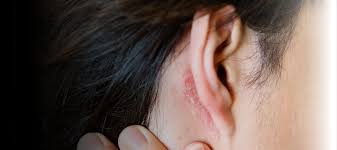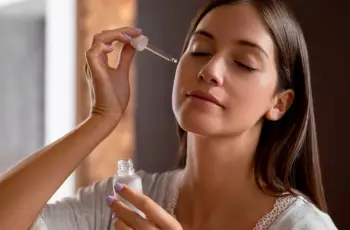
Dry Skin Behind Your Ears? Dermatologists Share 10 Effective Treatments
When we think about skincare, we usually focus on our faces, necks, and bodies. But how often do we give attention to the delicate skin behind our ears?
It turns out, this area is more important than many people realize. According to board-certified dermatologist Dr. Geeta Yadav, the skin behind the ears is often neglected in daily routines.
And as a result? Dryness, flaking, redness, or even itching can develop—especially when other skin issues are present.
Whether it’s due to harsh weather, product reactions, or a chronic condition like eczema, dryness behind the ears is a problem worth addressing.
In this guide, dermatologists explain what causes dry skin in this sensitive area and offer ten dermatologist-backed tips for soothing, healing, and preventing it.
Let’s explore what’s really happening behind your ears—and how to fix it.
Why Is the Skin Behind Your Ears So Vulnerable?
You might not think of the area behind your ears as being delicate—but it is.
It’s an area that sees friction from glasses, hats, and hair. It’s also exposed to weather, sweat, and products—yet it’s often skipped during skincare.
Dr. Yadav points out that the skin behind the ears is thinner and can dry out quickly when ignored. And dry skin is more prone to irritation and damage.
So what causes this dryness in the first place? There are multiple possible culprits.
Common Causes of Dry Skin Behind the Ears
Dryness in this area can stem from both external and internal factors. Below are some of the most common ones.
1. Environmental Changes
Cold, dry air in winter or indoor heating systems can strip moisture from your skin, including behind the ears.
2. Sun Exposure
Yes, your ears can get sunburned—especially if you’re not applying SPF there. After sunburns heal, the skin may peel and become dry or rough.
3. Eczema
Eczema, or atopic dermatitis, is a chronic condition that causes dry, itchy, inflamed skin. It can affect any area, including behind the ears.
4. Fungal Infections
Fungal infections like yeast or ringworm thrive in moist, warm areas. The space behind your ears, especially if sweaty, can be a breeding ground.
5. Allergic Reactions
Haircare products, perfumes, metals in earrings, or even certain detergents can trigger contact dermatitis, causing irritation and dryness.
6. Poor Hygiene or Neglect
Let’s be honest—most of us don’t actively clean behind our ears. Over time, buildup of sweat, dead skin, and oils can lead to irritation.
When Should You See a Dermatologist?
While mild dryness can be handled at home, certain signs mean it’s time for professional care.
If dryness persists despite treatment, it may be more than just dehydration—it could signal an underlying issue.
Seek medical advice if you experience:
Persistent dry patches that don’t improve.
Signs of infection like swelling, crusting, or pus.
Intense or constant itching.
Redness and scaling that spreads.
Similar symptoms elsewhere on your body.
A dermatologist can offer prescription solutions or pinpoint hidden triggers.
10 Derm-Recommended Ways to Treat Dry Skin Behind Your Ears
Ready to give this area the care it needs? These 10 dermatologist-approved tips will help heal dry skin and prevent future flareups.
1. Gently Cleanse the Area
Dr. Karan Lal recommends using a gentle, hydrating cleanser on the area daily.
Neglecting to wash behind the ears can lead to clogged pores, trapped sweat, and bacterial growth.
Choose a fragrance-free, non-stripping formula. Cleansing regularly will also help other skincare products absorb better.
2. Exfoliate Lightly and Occasionally
Exfoliation helps remove flakes and dead skin cells. But because this area is sensitive, go easy.
Use a soft, damp cloth to gently exfoliate once or twice a week. Avoid scrubbing or using harsh acids.
If using a product, choose something with lactic acid or PHA—both gentle and effective for dry, reactive skin.
3. Hydrate with Moisturizer
Moisturizing is a must. After cleansing, apply a lightweight but hydrating cream or lotion to help restore the skin barrier.
Look for ingredients like ceramides, glycerin, or hyaluronic acid. These lock in water and support healing.
Dr. Yadav recommends:
Cetaphil Daily Facial Moisturizer SPF 35 (hydrating + sun protection).
CeraVe AM Lotion with SPF 30 (contains niacinamide and hyaluronic acid).
Apply twice a day for best results.
4. Seal in Moisture with an Occlusive
An occlusive product helps prevent water loss by sealing in your moisturizer.
You can use a thin layer of Aquaphor Healing Ointment or Vaseline after moisturizing.
Natural alternatives like coconut oil can work too, especially overnight. Just make sure it doesn’t clog your pores.
5. Use Hydrocortisone for Inflammation
If the skin is red, itchy, or inflamed, a mild 1% hydrocortisone cream can calm the irritation.
Apply a thin layer once a day for up to a week. Avoid long-term use unless directed by your doctor.
This can be especially helpful if eczema or an allergic reaction is involved.
6. Avoid Irritating Hair and Skin Products
Many hair products drip or touch the skin behind your ears. Fragrances and alcohols in them can cause dryness and irritation.
Switch to fragrance-free, hypoallergenic shampoos and conditioners.
If your skin flares up after using new products, try an elimination method to find the culprit.
7. Be Cautious with Jewelry
Metal allergies, especially to nickel, can cause itchy, dry skin around the ears.
Dr. Lal advises choosing hypoallergenic earrings made of titanium, surgical steel, or 14K+ gold.
Clean your earrings regularly and don’t wear them for long hours if irritation occurs.
8. Protect Against Cold Weather
Cold, dry air pulls moisture out of your skin. And if you’re not covering your ears, they’re directly exposed.
Wear soft beanies or earmuffs during winter. Opt for cotton or hemp fabrics that don’t cause friction or itch.
Avoid wool or acrylic if your skin is sensitive.
9. Add a Humidifier to Your Room
Low humidity indoors can make your skin dry—even if you moisturize.
Using a humidifier helps restore moisture to the air, especially while you sleep.
Dr. Yadav says this is particularly helpful for eczema-prone individuals during winter months.
10. See a Dermatologist for Long-Term Issues
If the dryness doesn’t improve or comes back frequently, get a professional opinion.
You may need prescription antifungals, topical steroids, or patch testing to uncover allergies.
Never ignore worsening symptoms—especially if they spread or hurt.
Final Thoughts: Small Area, Big Impact
Dry skin behind your ears might seem like a small issue. But when ignored, it can lead to major discomfort.
By cleansing gently, moisturizing consistently, and avoiding harsh ingredients, you can keep this area soft, healthy, and irritation-free.
Be mindful of jewelry and hair products. And protect the skin behind your ears just as you would your face or neck.
If simple changes don’t solve the problem, a dermatologist can help you uncover the root cause.
Your ears deserve love too—so don’t leave them out of your skincare routine!


